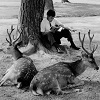The bestiary of Poèmes barbares: politics, ecology and poetology
DOI:
https://doi.org/10.51777/relief12340Keywords:
Leconte de Lisle, Poèmes barbares, ecopoetics, animal pattern, eschatologyAbstract
The study of the animal motif in the poetic work of Leconte de Lisle knows two major currents. On the one hand, the animal is considered in its analog value as a mirror of man, his psychological intimacy or his social organization. On the other hand, its description is a Parnassian attempt to create a poetry of objectivity: the animal is depicted as closely as possible to his bestial nature (in a biological or ethological sense). Faced with this double tradition, a careful reading of the collection Poèmes barbares, with particular attention paid to the entirety of the poems, and not only the animal poems, makes it possible to highlight an original poetic enterprise, on the part of Leconte de Lisle, which seeks to lay the foundations for a reunification of man and beast: separated by history and religion, both will meet again in a phenomenon of common extinction which will reduce both to silence. The poet of Bourbon Island, who reflects on the ways in which man should live with the animal and, more broadly, with nature, is thus engaged in an ecological reflection.
Downloads

Downloads
Published
Issue
Section
License
Copyright (c) 2022 Yohann Ringuedé

This work is licensed under a Creative Commons Attribution 4.0 International License.
All articles published in RELIEF appear in Open Access under the Creative Commons Attribution 4.0 International License (CC-BY 4.0). Under this licence, authors retain ownership of the copyright of their article, but they allow its unrestricted use, provided it is properly cited.






